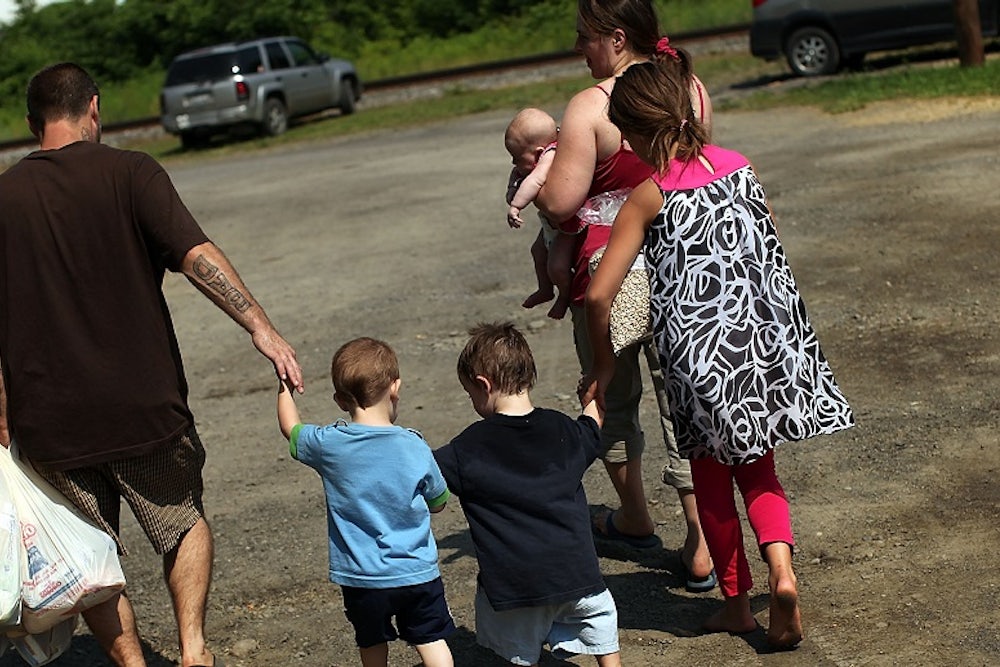This may be the most depressing story of the week: Maria Fernandes, a Newark woman who worked four jobs, died as she napped in her car Monday. The police said she regularly slept in her car in between jobs, but this routine became fatal when she fell asleep with her car running. The carbon monoxide and gasoline fumes killed her.
At The Incidental Economist, Aaron Carroll highlighted similar sobering stories from a Time piece about men and women pleading with workers at an impound lot to cancel the fee to get their towed cars back. “I’m gonna lose my job if I’m not there at 5,” one woman said. Another said, “I have to pick up my kids in less than an hour. What am I supposed to do?” These impossible situations are a daily part of life for many Americans. Many more live in fear of them. As Carroll argues, the ability not to live in fear of them—to easily afford to pay the fee to get your car back after it’s been towed—is what “wealth” really is. “To many Americans, a towed car is a nuisance,” he wrote. “A real one, yes, but in the scheme of things, no more than that. That’s wealth. That’s privilege.”
In Thursday’s New York Times, Abby Goodnough relays the story of Terri Hall, a woman from Kentucky whose addiction to alcohol and Xanax cost her a marriage. But thanks to the Medicaid expansion, she’s finally receiving the mental health care she needs, albeit not frequently enough due to long waits for appointments. “I haven’t felt this way since I got my divorce,” Hall said about her potential eviction. “Then, I went back to Xanax, and I don’t want to do that this time. I want to be able to handle this somehow.” The mental health care available to her under Obamacare is helping her do so.
In Washington D.C., it’s easy to forget these everyday Americans. It’s easy to get caught up in wonky subjects, to pursue perfect solutions and to subjugate policy for politics. But Labor Day weekend is the perfect opportunity to think about those who sleep in their cars in between shifts or for whom a $25 co-pay is a back-breaking expense. For decades now, too many American workers have seen little, if any, improvement in their wages. Others lost their job after the financial crisis—an event many had no part in creating—and haven’t recovered. We now know that the costs of unemployment extend far beyond just losing a job. For instance, a new Urban Institute paper released Thursday finds that unemployment creates family instability, particularly for single mothers without a high school degree.
This isn’t to say that every low-income American faces these situations. And reasonable people can disagree over the correct policy prescriptions for poverty. But over Labor Day weekend, with Congress still on recess, take a moment to step back from the policy world and think about the poor Americans who do everything they can to get ahead, yet just can’t make it. Think about Maria Fernandes and Terri Hall. And then remember Aaron Carroll’s words about the seemingly insignificance of a $25 expense. “It may [seem that way]…to you. But not to everyone. Not to far more people in this country than you likely realize.”
—Danny Vinik
News from Thursday:
OBAMACARE, PART 1: The federal government announced that it was approving Pennyslvania's proposal to expand Medicaid, via the Affordable Care Act, which means nearly half a million low-income adults will now get insurance. It's the ninth state with a Republican governor to do so. (Jason Millman, Wonkblog, Amy Worden, Philadelphia Inquirer)
OBAMACARE, PART 2: Consumers with "inconsistencies" in their applications for financial aid—typically, related to residency and immigraiton status—are rushing to meet a September 5 deadline to submit new paperwork. But many say they are running into website problems and other issues. (Jayne O'Donnell, USA Today)
ECONOMY: Second quarter GDP growth was revised up to 4.2 percent, a great sign after the dismal first half of the year. Even better, business investment, which has lagged for much of the recovery, surged upwards 8.2 percent. (Sam Ro, Business Insider)
FOOTBALL AND DOMESTIC VIOLENCE: In response to criticism that the NFL was too lenient on domestic violence, NFL Commissioner Roger Goodell announced that the league had been wrong—and that, henceforth, it would impose harsher penalties. (Jane McManus, ESPN)
Articles worth reading:
Why the South is resisting the Medicaid expansion: As Jonathan Chait notes, they're also having some trouble getting over the Civil War. (New York)
When abortion was legal in only six states: Amelia Thomson-Deveaux reminds us who was able to get around the restrictions—and who wasn't. (FiveThirtyEight)
The rental housing crisis: The country faces a shortfall in affordable housing as demand for rental units has skyrocketed. That’s giving landlords lots of leverage. And they’re using it: Evictions have soared as well. (Shaila Dewan, New York Times)
Why it feels like the recession didn’t end: Christopher Ingraham reports on a new study from the Economic Policy Institute that finds limited wage growth for the average American since the financial crisis. (Washington Post)
Stories we’re watching:
Not much. Shaping up to be a pretty slow pre-Labor Day Friday.
At QED:
Amy Cohn, an expert on the airline industry, explains why airlines screw you over—and how to avoid it. And the Ninth Circuit Court of Appeals gave a big victory to some FedEx drivers Wednesday.
